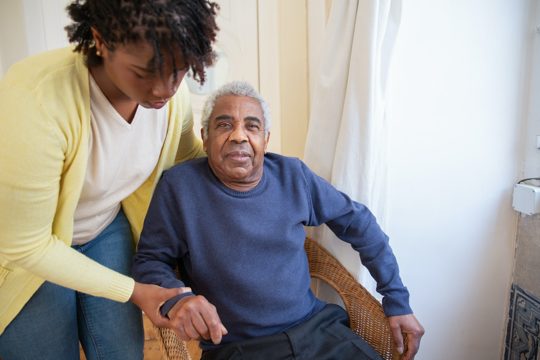Home Nursing: Types and Benefits
Home nursing is the provision of nursing care services at the patient's home. It is an ideal way of providing personalized medical care to those who are unable to attend a hospital or clinic.
Home nursing can help patients to recover from illness or injury in the comfort of their own home and to maintain their independence. Home nursing services are usually tailored to the patient's needs and can range from basic care such as wound dressing and help with daily activities to more complex medical treatments delivered by a multidisciplinary team. Home nursing is an invaluable service for those who are unable to access other care facilities due to physical or mental health issues, time constraints or geographic location.

It can also be a great option for those who need assistance with the recovery process after a hospital stay, as it can provide continuity of care and a safe environment in which to recover. Home nursing staff are an integral part of any medical team, providing vital support to both patients and their families.
They use their expertise to assist with a range of tasks, from providing medical care to helping with daily activities and ensuring the home environment is comfortable and safe. Home nursing services can be an important part of the care plan for those with long-term health conditions, offering specialist advice and support, as well as providing emotional and psychological support to patients and their families.
Benefits of Home Nursing
Home nursing has many benefits for patients. It provides a more personal and individualized care experience, which can improve the quality of life for patients.
It also allows patients to remain in their own home, surrounded by familiar surroundings that can help to promote healing and recovery. Home nursing can also provide a cost-effective alternative to traditional medical care. Home nursing also offers the opportunity for greater continuity of care, as the same nurse will often visit the patient multiple times over the course of their recovery.

This continuity enables the patient to develop a trusting relationship with their nurse, which can have a positive effect on their well-being and recovery process. Additionally, home nursing offers greater flexibility and convenience for both the patient and their family, as they can receive care in the comfort of their own home, without the need to travel or disrupt their daily routine.
Furthermore, home nursing offers increased privacy and security, as the patient’s confidential information will remain within their home and not be shared with other medical staff or facilities. The benefit of home nursing is that it allows the patient to be at the center of their own medical care and to receive treatment in a comfortable and familiar environment.
Types of Home Nursing
Home nursing can include a variety of services, such as wound care, intravenous therapy, medication management, and patient education. Home nurses may also provide palliative care, which includes providing emotional support and comfort to patients and their families.
Home nursing can also include providing care for patients who are transitioning back home after a hospital stay or for patients who need long-term care. In addition, home nurses can provide assistance with daily activities such as bathing, grooming, and dressing. They can also provide assistance with nutrition and meal planning, as well as in-home physical therapy and rehabilitation services.

Home nurses can also help patients manage their medications by helping to organize and monitor medication schedules and providing education on appropriate medication use. Home nurses can also provide education on disease management, self-care, and safety.
Furthermore, they can provide support and companionship for the patient and their family members, helping to alleviate loneliness and boredom. Home nurses can also be a valuable resource for information and support for the family, providing guidance on coping with the illness and providing support through difficult times.
Home Nursing Providers
Home nursing is typically provided by qualified nurses or healthcare professionals. Home nursing services are often provided through home health agencies, private nursing companies, or through hospitals or physician practices.
Home nursing services can be covered by insurance, depending on the patient's individual plan. Home nursing is typically provided by skilled and experienced nurses or healthcare professionals who are certified to provide such services. Home nursing services may be covered by insurance, depending on the patient's individual plan, and are often provided through home health agencies, private nursing companies, or through hospitals or physician practices. Home nursing services can provide assistance with daily activities such as bathing, dressing, meal preparation, and light housekeeping.

They can also provide more specialized care such as wound care, IV therapy, and medication management. Home nursing can be an invaluable service for those who are elderly, disabled, or recovering from an illness or injury.
It can help patients maintain their independence and quality of life, while providing support and peace of mind for family members. Additionally, home nursing services can be tailored to meet the individual needs of each patient, ensuring that care is provided in the most appropriate and effective way possible.
Safety of Home Nursing
Home nursing is a safe and effective way to provide medical care in the home. Home nurses are trained to recognize and respond to any potential risks that may arise in the home environment.
They are also trained to provide appropriate care and safety measures to ensure the patient's well-being. Home nursing also provides convenience for the patient. By receiving medical care in their own home, the patient is able to stay in a familiar environment, remain in the comfort of their own home, and maintain their independence.

Home nurses are able to tailor their care to the individual needs of the patient, making sure that the patient is receiving the best care that fits their unique situation. Home nurses are also able to provide assistance with everyday tasks such as bathing, walking, and preparing meals, so that the patient can continue to live a full and independent life in their own home.
Home nurses are highly trained professionals and they strive to provide the highest level of care to ensure the patient's safety and wellbeing.
Cost of Home Nursing
The cost of home nursing services can vary depending on the type of services required and the location of the home. Home nursing services may be covered by insurance depending on the patient's individual plan.
It is important to check with the patient's insurance provider to determine if home nursing services are covered. Additionally, some home nursing providers may offer discounts to those in certain financial situations. Furthermore, those seeking home nursing services should also consider the expertise and qualifications of the provider.

Since home nursing is a specialized skill, it is important to make sure that the provider has the necessary credentials and experience to deliver the highest quality of care. Moreover, it is beneficial to ask for references and to read patient reviews prior to selecting a home nursing provider.
Additionally, it is important to discuss the fees involved prior to the start of services. Finally, it is critical to ensure that the provider is familiar with the patient's individual needs and that the patient is comfortable with the provider.
Creating a Home Nursing Plan
When setting up home nursing services, it is important to create a plan that outlines the patient’s needs, the type of care that will be provided, and the frequency of care. It is also important to discuss any potential risks with the home nurse and to ensure that the home is safe and suitable for home nursing services.
Furthermore, it is important to have a plan for any potential emergency scenarios that may arise, such as power outages, natural disasters, or other unexpected events.

It is also essential to ensure that the home nurse has access to all necessary medications, supplies, and equipment, and that the patient has an understanding of how these items should be used and stored. Finally, it is important to ensure that the home nurse is familiar with the patient’s medical history and any treatments or therapies they may receive so that they are able to provide the best care.
Conclusion
Home nursing is an effective and safe way to provide medical care in the home. Home nursing can help patients to recover from illness or injury in the comfort of their own home and to maintain their independence.
It is important to ensure that the home is safe and suitable for home nursing services and to create a plan that outlines the needs of the patient. Home nursing services also provide the patient with support from a team of healthcare professionals. This team will usually include a doctor, nurse, and a social worker. The team will assess the patient’s condition and devise an individual care plan that is tailored to their needs.

Furthermore, they can provide education and advice on managing the patient’s condition and any other medical issues that may arise. Home nursing services can also provide support for the patient’s family and the carers who provide support to them.
They can provide support and advice on how to best care for the patient and help to coordinate any additional services that may be needed. These services can help to ensure that the patient receives the best possible care and that their recovery is as speedy and successful as possible. Home nursing services are invaluable in providing medical care to those who are unable to access it in a traditional setting.
About us
Welcome to SeniorCaresHub! Welcome to our comprehensive senior care destination! We pride ourselves on being a trusted resource for all things related to caring for aging loved ones. We understand the unique needs and challenges that come with senior care, and our mission is to provide you with the information, resources, and support you need to confidently navigate this journey and help you provide the best possible care for your aging loved one.

